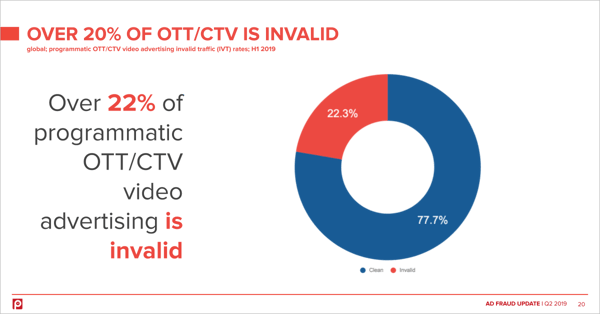
This week's review of ad fraud and quality in the digital advertising space.
Pixalate continues its video interview series with industry leaders, including:

"What would the industry do if it heard almost a fourth of Nielsen’s panel were bots: frauds, robotic fictions, not real people?" posed Simulmedia CEO Dave Morgan as a rhetorical question in a MediaPost op-ed. "Folks would be up in arms."
"Juxtapose the anticipated rabid reaction to that hypothetical problem with the tepid industry reaction to research from Pixalate telling us 22% of the programmatic ad delivery on OTT (over-the-top) and CTV (connected TV) today is fraudulent," Morgan added.

"Among the more popular places to find ... unauthorized content is a site called TeaTV," reported CNBC. "The online service offers a wide swath of pirated movies from major networks such as HBO and streaming services including Netflix as well as current releases from top movie studios. Video ads have shown up from brands including TikTok, streaming service BET+, the Madden Mobile video game, music streaming service Pandora, Pluto TV, Hulu, Yahoo Mail and many more."

"Seventeen malicious iPhone apps have been removed from the Apple App Store after being found to click on adverts secretly, generating income for cyber criminals," reported ZDNet. "The applications -- all from the same developer -- were found conducting ad-fraud, by clicking links and continuously opening windows in the background without the user's knowledge in order to generate revenue for the attacker."
 "Roku is buying Dataxu, a platform that lets marketers plan and buy video ad campaigns, for $150 million in cash and stock," reported CNBC. "Roku said buying Dataxu’s platform will complement its existing ad platform and give marketers a software solution that lets them plan, buy and optimize ad spend across TV and over-the-top providers."
"Roku is buying Dataxu, a platform that lets marketers plan and buy video ad campaigns, for $150 million in cash and stock," reported CNBC. "Roku said buying Dataxu’s platform will complement its existing ad platform and give marketers a software solution that lets them plan, buy and optimize ad spend across TV and over-the-top providers."
*By entering your email address and clicking Subscribe, you are agreeing to our Terms of Use and Privacy Policy.
These Stories on Weekly Recaps
*By entering your email address and clicking Subscribe, you are agreeing to our Terms of Use and Privacy Policy.

Disclaimer: The content of this page reflects Pixalate’s opinions with respect to the factors that Pixalate believes can be useful to the digital media industry. Any proprietary data shared is grounded in Pixalate’s proprietary technology and analytics, which Pixalate is continuously evaluating and updating. Any references to outside sources should not be construed as endorsements. Pixalate’s opinions are just that - opinion, not facts or guarantees.
Per the MRC, “'Fraud' is not intended to represent fraud as defined in various laws, statutes and ordinances or as conventionally used in U.S. Court or other legal proceedings, but rather a custom definition strictly for advertising measurement purposes. Also per the MRC, “‘Invalid Traffic’ is defined generally as traffic that does not meet certain ad serving quality or completeness criteria, or otherwise does not represent legitimate ad traffic that should be included in measurement counts. Among the reasons why ad traffic may be deemed invalid is it is a result of non-human traffic (spiders, bots, etc.), or activity designed to produce fraudulent traffic.”

